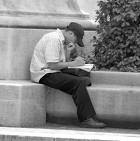The big day has come and gone. What day you ask? Publication day for Dan Brown's long awaited thriller The Lost Symbol, a follow-up to the Da Vinci Code and Angels and Demons.
.
These three novels have a number of similarities-- an intrepid and intelligent hero meets up with an alluring heroine in a major city; the pair then deal with a conspiracy involving secret codes and gruesome villains. Also, the author uses an over-the-top writing style to unravel the plots at break-neck speed.
.
Though Janet Maslin gave The Lost Symbol a good review in the New York Times, Brown's style has drawn some satiric comment, such as an article in the British newspaper the Telegraph about Dan Brown's worst sentences. My favorite among these sites though is the Dan Brown Plot Generator, which allows one to choose a city and an organization, press enter, and bingo-bango a plot appears.
I'm not sure Dan Brown is worrying too much about these sites, however, as The Lost Symbol sold a million copies the day it came out.




